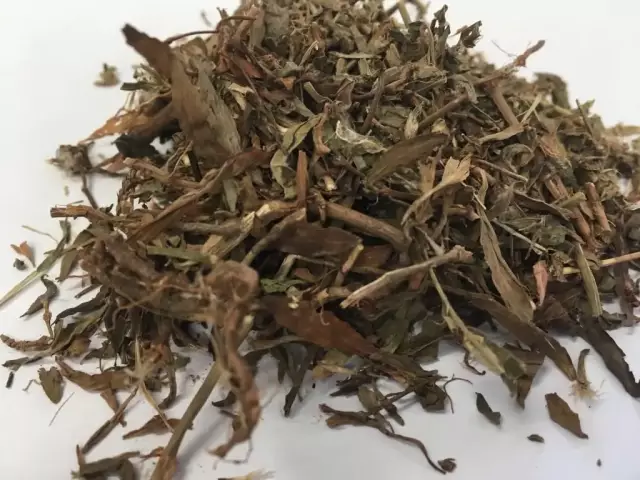- Author Rachel Wainwright wainwright@abchealthonline.com.
- Public 2023-12-15 07:39.
- Last modified 2025-11-02 20:14.
Knotweed
Instructions for use:
- 1. Useful properties
- 2. Application
- 3. Contraindications

Knotweed is a herbaceous plant that grows everywhere: in parks, on roadsides, on riverbanks, in courtyards and gardens. Common names for knotweed are murava grass and bird highlander.
The knotweed herb contains fiber, astringents, calcium, silicon, phosphorus, zinc, manganese, carotene, vitamins E, C, K, flavonoids, glycosides, organic acids, wax, resins, sugars, and ash.
Useful properties of knotweed
The stems of the plant are of interest for medicine, they are collected when the knotweed blooms. It is better to dry the grass in the shade, in attics, and store it in paper bags or bags made of natural materials for three years.
The following medicinal properties of knotweed are known: diuretic, wound healing, tonic, anti-inflammatory, diaphoretic, antipyretic. The plant helps to remove stones and sand from the gallbladder, kidneys, and stimulates metabolism.
Using knotweed
Knotweed is prescribed for jaundice, which has developed due to the formation of stones in the gallbladder, for kidney disease caused by edema.

Due to the diuretic properties of knotweed, except for kidney diseases, it helps with gout, salt metabolism disorders, and obesity.
To relieve fever, the herb infusion is used for bronchitis, pleurisy, tuberculosis, pneumonia, bronchial asthma, whooping cough, and fever.
Gargling with warm herbal infusion is useful for inflammation of the mucous membranes in the mouth. Such procedures can help eliminate hoarseness.
Known and the hemostatic property of knotweed, which helps women with uterine bleeding after abortion or childbirth and heavy menstruation, as well as with internal, external bleeding. The broth can also be used with douching laundry.
Helps knotweed with infertility, not associated with mental problems: the plant tends to improve the work of the muscles of the uterus, improve the supply of oxygen to the body.
Knotweed is used for infertility as follows: a glass of fresh or dry grass is poured with a liter of boiling water, steamed for 3-5 minutes and drunk strained, replacing other drinks with this infusion. There is no time limit for treatment with knotweed for infertility, and a woman can drink the infusion until pregnancy occurs - the herb can cause a miscarriage, therefore this condition is considered one of the main contraindications for knotweed.
An alcoholic tincture of the plant is also effective, which is prescribed to be taken for diarrhea, dysentery, gastritis, activity disorders and gastrointestinal ulcers, liver diseases, pancreatic glands, diabetes.
External use of knotweed is effective for non-healing wounds, for bruises, abscesses, burns, tumors, boils: they make lotions, rinses, and broth baths. On the affected skin, you can apply, and fresh knotweed herb.
The plant helps with nervous exhaustion, neurasthenia, weakness, strengthens after a long illness, helps to lower blood pressure, relieves rheumatic spasms and headaches, it is useful to drink decoctions from it for the elderly.
To prepare the broth, pour 250 ml of boiling water with one tablespoon of the herb, insist for half an hour. Drink the broth three r / day on a tablespoon.
To obtain an alcoholic tincture, the grass in a ratio of 1:10 is poured with 70% alcohol, insisted in warmth for 24 hours, then filtered. Take a tincture of 10-20 drops, 3-4r / day before meals, mixing with water.
Knotweed contraindications
In addition to pregnancy, the main contraindications for knotweed are low blood pressure, thrombophlebitis. It is undesirable to drink herbal decoctions for gastritis, gastrointestinal ulcers and increased acidity of gastric secretions. With caution, drugs from a plant are prescribed for glomerulonephritis.
If long-term use of knotweed is expected, blood clotting should be checked regularly.
Information about the drug is generalized, provided for informational purposes only and does not replace the official instructions. Self-medication is hazardous to health!






